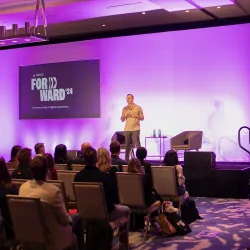Industry Knowledge
Conscious Consumerism—It’s a Thing!
When examining the aisles of endless food, beverage, and home products, do you even consider the impact of every item you add to your cart? Often out of necessity, many of us focus first on the cost. However, with the pandemic’s disruptive implications, our livelihood, values, lifestyle, shopping behavior, communication, and social habits now help dictate or influence our consumption choices as conscious consumers.
We have become more critical about the source of our purchases and may even have questions about, for example, how chickens are raised, if farmers use organic methods, or the impact of poultry farming on climate change. Yes, we now need to know about a product’s social and environmental impact—and if there are better alternatives.
Conscious consumerism is a movement in which consumers use their purchasing power to patronize ethically-sourced products and support positive social, economic, and environmental causes. By eliminating impulse purchases and opting for companies and products that create a positive impact, consumers are able to communicate their preference for better-for-the-world businesses and products. It’s also known as ethical consumerism or green consumerism, and it is a trend that grows more and more popular by the day1.
Supply and Demand
As consumers alter their purchasing decisions in ways never been predicted before, conscious consumerism is expected to become a vital staple among shoppers. Simply put: conscious consumerism is here to stay. Today, consumers not only buy something because it is affordable2. Despite the law of supply and demand ruling the market of Retail & E-commerce, consumers nowadays have a significant impact on the demand side of the equation. As consumers now focus on meaningful changes in their preferences, these affect what they buy and use.
For instance, people are now installing smart thermostats in their homes to reduce energy consumption when they are away. This behavior helps cut utility costs but also minimizes greenhouse gas emissions. While reducing carbon emissions is not the most potent practice consumers can do, it still shows that people want zero-carbon alternatives and are willing to spend for them. When consumers pay more for an electric car, a heat pump, or a plant-based burger, it's a proclamation that, “There’s a market for this. We demand it.” This idea would then send a signal to companies to put more money and resources into making low-emission products, which would drive prices down. As a result, we can look forward to a future where more people—in significant numbers—adopt green technology. This movement enables investors to be more confident in funding companies that create breakthroughs that can help us achieve zero-carbon emission3.
Today’s Digital Age and TaskUs
Today, brands need to ensure that their products and services serve a higher purpose and contribute to a better world. The truth, however, is that it is only half the battle. Brands should be able to back this up with strategy and structure. When advancing such causes and advocacies, it’s essential to partner with an organization that shares the same vision: to create a sustainable social, economic, and environmental impact on the world. It’s vital to work with strategic experts who uphold the same culture and values while innovating—and even disrupting. The effect is embedded in a strong culture that puts people front and center.
At TaskUs, we create value and meaningful impact not just for our clients, but to our community and environment as well. We do this by investing in our people. This investment pays enormous dividends for stakeholders across the board. Putting employees first is a proven way to drive clients’ performance, win new businesses, increase revenue, and pay investors’ returns. It’s the way TaskUs conducts business, and our people will always be our most important investment.
For organizations aspiring to reach the next level, consider an employee-first strategy as a critical differentiator. Brands should start thinking about developing and implementing a successful approach to improve employee engagement and enhance workplace culture. After all, it’s a bottom-line business truth that fulfills employees—people who are confident that their voices are being heard and valued by company leadership perform better.
Committing to a significant program to capture, analyze, report, and respond to employee issues can feel like a daunting challenge. Still, the results will keep employees engaged and drive talent acquisition, which is the lifeblood of competitive companies today.
To learn more about current Retail & eCommerce trends and how TaskUs solutions can help companies in this space, visit Us here.
References

We exist to empower people to deliver Ridiculously Good innovation to the world’s best companies.
Services







